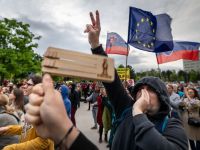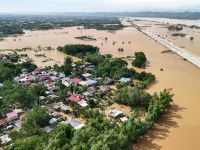A conference which is due to focus on Israel's handling of security in the occupied Palestinian territories will go ahead on Wednesday despite Israeli protests, Swiss officials said on Tuesday.
Israel had earlier appealed for the special one-day meeting to examine the application of the Fourth Geneva Convention on protecting civilians in the occupied territories to be called off following the deadly suicide bombings in Israel over the weekend.
Switzerland has been organizing the conference in its capacity as depository of the wartime humanitarian code, but the severe escalation in violence in Israel and the occupied territories in recent days has raised the political stakes for the meeting.
Israel, which is boycotting the Geneva conference, on Tuesday launched air strikes across the West Bank and Gaza Strip following a series of retaliatory raids on Palestinian territories the day before.
"The answer is clear. The state parties which called for the conference and have announced they would be taking part have not changed their stance," Swiss foreign ministry spokeswoman Muriel Berset said.
Israel's ambassador to the UN in Geneva, Yaakov Levy, said the meeting of about 100 countries would be "meaningless" if it did not take into account the attacks over the weekend in Jerusalem and Haifa, which killed at least 25 people.
But Berset indicated late on Tuesday that Israel's long-standing boycott counted against its appeal for a postponement or a cancellation and that a preparatory panel had not changed its stance.
Twenty-five countries or groupings on the panel, including the OIC, the Arab League, the US and the European Union (EU) helped to draft a final declaration for the conference.
Levy said he had appealed to the EU to support Israel's position.
The conference of countries party to the Geneva Conventions was convened following a request by the United Nations General Assembly as well as the Arab League and the Organisation of Islamic Conference members in October 2000.
Swiss officials said last week that they had planned carefully to avoid confrontation and negotiated a "balanced" final declaration for the conference.
"There is no space for last minute controversy," Pierre-Yves Fux of the Swiss foreign ministry told journalists.
The Fourth Geneva Convention, a cornerstone of international humanitarian law which Israel ratified in 1951, provides protection for civilians notably those living under military occupation.
Israel disputes the validity of the Convention in the territories, which it calls "disputed territory".
"In our view, it's an attempt to politicise a humanitarian issue, we have said from the beginning we would not take part," an Israeli diplomat said.
About 100 of the 189 states which are party to the Geneva Conventions are expected to attend, according to Swiss officials.
"If it appears that Arab countries are raising the stakes, such during discussions on a third approved (Red Cross) emblem, when inflammatory texts were introduced, then it will be all wrong," a western diplomat told AFP.
"It is not an event aimed against Israel," she added.
The emblem issue has kept Israel's equivalent of the Red Cross out of the International Red Cross movement largely due to Middle Eastern opposition.
Although the United States is also staying away from the Geneva Convention meeting, Swiss officials said the US, as a permanent member of the UN Security Council, formally helped prepare the meeting, while Israel was consulted informally.
Switzerland said the declaration would stress that respect for the Fourth Convention and humanitarian law was essential for a just and lasting peace.
But Fux acknowledged that the real test will be if it has an impact in the field.
"If we have less civilian victims and less violence and a contribution to a political solution which takes into account the interest of the civilians, that will be a success," he added.
Amnesty International on Tuesday called on the conference to back moves to send international observers to the region.
A previous conference in Geneva in July 1999, also boycotted by Israel, was adjourned within minutes to avoid upsetting a resumption of the Middle East peace process at the time, according to Swiss officials.
It issued a statement reaffirming the Convention's applicability in "Occupied Palestinian Territory, including East Jerusalem".
Wednesday's conference will also hear from the International Committee for the Red Cross (ICRC), UN High Commissioner for Human Rights Mary Robinson, and the UN Refugee Works Agency (UNRWA) which takes care of Palestinian refugees -- GENEVA (AFP)
© 2001 Al Bawaba (www.albawaba.com)







